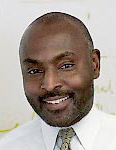


Harry Reed, who retired this past March as head of the Lab's Office of Workforce Diversity, died yesterday. He was 60 years old. Reed began work at the Lab in 1982 as a collective bargaining representative in Labor and Employee Relations. He served as the Personnel Director (now the Chief Human Resources Officer) from 1988 to 1993 and was instrumental in establishing the Lab's Office of Workforce Diversity and the Diversity Council. He was named the Lab's Ombudsman in 2006. There is no information on a memorial service at this time, but those details will be published in Today at Berkeley Lab when they become available. A grief counselor from UC Berkeley's CARE Services will be at the Lab today from noon to 3 p.m. in Building 46A-1126.
 Researchers — including Greg Hura of the Physical Biosciences Division — have developed a fast and efficient way to determine the structure of proteins, shortening a process that often takes years into a matter of days. The high-throughput protein pipeline could allow scientists to expedite the development of biofuels, decipher how extremophiles thrive in conditions that kill most organisms, and better understand how proteins carry out life's vital functions. More>
Researchers — including Greg Hura of the Physical Biosciences Division — have developed a fast and efficient way to determine the structure of proteins, shortening a process that often takes years into a matter of days. The high-throughput protein pipeline could allow scientists to expedite the development of biofuels, decipher how extremophiles thrive in conditions that kill most organisms, and better understand how proteins carry out life's vital functions. More>
 People: DePaolo Uses Atomic Tracers to Piece Together Earth's History
People: DePaolo Uses Atomic Tracers to Piece Together Earth's HistoryAs anyone who has watched "CSI" knows, police use blood, mud, fibers and other environmental clues to pin suspects to their crimes. Such tracers can help reconstruct past events as though it were captured on film. Donald DePaolo, a Berkeley professor of geochemistry and director of Berkeley Lab's Earth Sciences Division, is an expert at interpreting environmental tracers of a far smaller kind. He uses isotopes — atoms of the same element with different numbers of neutrons — to piece together the history of rocks, water, pollution, and even air. More>
 Computing: NERSC Upgrades Franklin to Double Its Scientific Capability
Computing: NERSC Upgrades Franklin to Double Its Scientific CapabilityNERSC has officially accepted a series of upgrades to its Cray XT4 supercomputer, Franklin, providing the facility's 3,000 users with twice as many processor cores and an expanded file system for scientific research. "Franklin's upgrade has already provided a tremendous benefit to the DOE computational science community, which now has a system in which the aggregate system performance is double the speed of the original Franklin system," says Kathy Yelick, NERSC Division Director. "The key to improving application performance is to maintain balance for that workload, so when we doubled the number of cores, we also doubled the memory capacity and bandwidth, and tripled the I/O bandwidth." More>
 In The News: At 40th Anniversary of Moon Landing, Is Unmanned the Way to Go?
In The News: At 40th Anniversary of Moon Landing, Is Unmanned the Way to Go?[Pittsburgh Post-Gazette] Looking back on Neil Armstrong's moon walk 40 years ago, many Americans may feel that the thrilling potential of human space exploration lost its promise years later after the Challenger and Columbia space-shuttle disasters. Berkeley Lab physicist Richard Muller makes that case as well. "I think the glory of NASA in the last 25 years has been in the unmanned exploration of the solar system," says Muller. "So if the goal is scientific discovery, it makes no sense to put humans in space, and I can say confidently that I speak for the majority of scientists on this." More>
From a new "healthy relationships" workshop to a class on achieving a sound retirement, the HR Benefits department hosts a number of events to help staff manage their work and life. To assist in tracking upcoming events, the department produces a monthly calendar, and the August edition is now available.
Today at Berkeley Lab is produced by Public Affairs' Communications Department